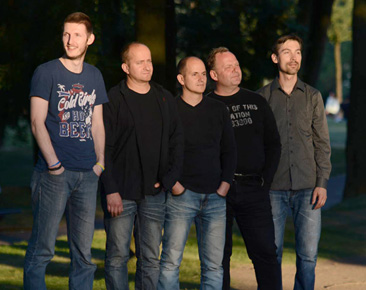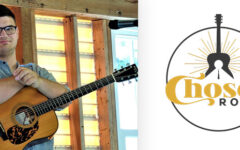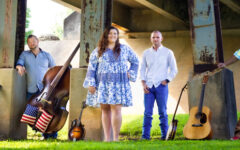
 This article is a contribution from Pepa Malina, fiddler with Monogram, perhaps the longest established bluegrass band in eastern Europe. He tells an agonizing story about the group attempting to visit the US this summer to perform at the ROMP festival in June, but being prevented from entering the country on account Visa problems. It is mildly ironic as the cover for the band’s most recent album depicts them as both passengers and airline officials arguing over a guitar apparently damaged in transit.
This article is a contribution from Pepa Malina, fiddler with Monogram, perhaps the longest established bluegrass band in eastern Europe. He tells an agonizing story about the group attempting to visit the US this summer to perform at the ROMP festival in June, but being prevented from entering the country on account Visa problems. It is mildly ironic as the cover for the band’s most recent album depicts them as both passengers and airline officials arguing over a guitar apparently damaged in transit.
Theirs can hopefully serve as a cautionary tale for bluegrass artists seeking to tour outside the US, or those from outside seeking to tour here. Visa regulations are ever tighter in these days of heightened terrorist concerns, and having the right paperwork can be the difference between a lovely time abroad, and a tiresome episode filled with disappointment.
Here is Pepa’s story…
 This year, the Czech bluegrass band Monogram celebrate their 25th anniversary. Since 2014 Monogram have been performing with a new lineup in which they made their current album titled Take it Easy. In 2015, the band won the prestigious “European Bluegrass Band of the Year” award at a festival in Voorthuizen, Netherlands. Representatives of the European Bluegrass Music Association selected them for a slot at the ROMP festival in Owensboro, KY whose organizers have been working with the EWOB for several years.
This year, the Czech bluegrass band Monogram celebrate their 25th anniversary. Since 2014 Monogram have been performing with a new lineup in which they made their current album titled Take it Easy. In 2015, the band won the prestigious “European Bluegrass Band of the Year” award at a festival in Voorthuizen, Netherlands. Representatives of the European Bluegrass Music Association selected them for a slot at the ROMP festival in Owensboro, KY whose organizers have been working with the EWOB for several years.
In December 2015 ROMP and Monogram agreed on a contract for a performance at the ROMP festival on June 24, 2016. The subject of the contract was a performance for approximately 45 minutes at the ROMP festival with no compensation apart from accommodations for the group at the event.
Looking at the conditions governing the entry of foreigners in the USA, the band found out that they probably belong in the P category (work visa), i.e. people with exceptional abilities in science, arts, education, business or athletes. Based on this information, Monogram decided to apply for a work visa and contact the American agent for Czech band Druhá Tráva and asked her for help in this matter.
After finding out that the total price for the visas would climb up to $2,500, Monogram asked the agent to secure several appearances in the USA to cover these costs. To do this, the stay in the US would have to be extended to about 15 days. The cost of accommodation, car rental and meals would be approximately $7,000.
After discovering that the American agent had not managed to secure a sufficient number of concerts to at least partially cover these costs, Monogram contacted ROMP organiser Mr. Chris Love with concern that the performance of the band at the festival is in jeopardy. Mr. Love speculated that the band could arrive only with the ESTA authorisation if it has a letter from the organiser of the festival, which would indicate that the band will play at the festival free of charge and will have no other concerts, i.e. no income in America. The co-operation between the American and European Bluegrass Music Association has been working like that for several years.
Monogram had two options a month before departure. Bringing the application for a work visa to the end and pay all the expenses with the prospect of a big loss, since the whole process of issuing work visas could take too long, or fly trusting in the ESTA program and risk that US immigration authorities wouldn’t allow the band to enter the country.
The band decided to take the opportunity to fly under the ESTA program. After filling out the appropriate ESTA forms and paying the fee of $14 (USD) per person, ESTA authorization was granted to all members.
On June 21st Monogram flew with British Airways to England. At Heathrow airport while waiting to board their flight on American Airlines they were subjected to about five minutes of questioning from an immigration officer. The officer interviewed the whole band, asking questions like: “What is your reason for your stay in the USA? Are you a musical band? What is your name? What instruments do you play? Where will you live? How long have you been playing for?” and so on.
After an eight-hour flight, Monogram landed at O’Hare Airport in Chicago.
After about an hour the whole band got to the immigration control checkpoint. Prior to this point, all members of the band made sure that when asked they will provide truthfully all information relating to their stay in the USA.
When checking the first member the official asked similar questions as the official in England. After finding out that it is a music group they asked the whole band to show passports with which the official left. After five minutes waiting, he came with a colleague who took the group into the waiting area of immigration control. After an hour of waiting without any information, an officer came out and invited everyone to follow him. Inside the room, he informed the band that they have a big problem: “You’re a music band, you’re going to play at a festival, you have a website, you have recorded a video clip, you’ve recorded five albums and in the calendar you have written down concerts in the Czech Republic, therefore you are a professional band that is going to carry out your performance art, and thus need a work permit”. There was a brief debate, which concerned the daily employment of all group members and the argument that music is mainly a hobby for Monogram. Furthermore, the band asked whether there is any way to reverse the refusal of entry into the United States. The official who was dealing with the band was very polite and suggested they contact the organiser of the festival to verify the details of Monogram’s planned stay in the US.
After another two hours the band waited in the immigration office in the building of the complex area of about 10×10 meters with about thirty other detainees, including small children. At this point, there was no possibility of any food. The band could get water at the toilet upon request. Baggage, including musical instruments waited about 20 metres away next to the conveyor belt, with many people passing-by. A request to reclaim the baggage was refused by the guards. The atmosphere among the detained people was very tense. The main inconvenience was fatigue after travelling sixteen-hours — and also the uncertainty. The guards strictly prohibited use of mobile phones so the band could not inform friends where they were, or to cancel their car rental or hotel reservations.
After two hours the immigration officer came in with information that even a telephone conversation with the organizer did not affect his decision and that the final verdict was refusal of entry. This was followed by interviews with individual members of the band. Each lasted about half an hour. Then, each member received a legal document with the reasons for the rejection. The official who was in charge of the band, offered water and something to eat for the members. Crackers, nuts, etc. His behaviour was very fair, and he regretted the final verdict. He appreciated the cooperation of the band and offered the possibility of immediate return via American Airlines that very evening.
After five hours spent at the immigration facility, the band was handed over to two armed officers from the immigration office. The musicians and their baggage were loaded into an armoured van, locked. After about thirty minutes the band could board the aircraft as the last passengers. The crew of the aircraft were ordered to return passports to the band at the transfer at London airport, and the band returned to Prague after 40 hours without fresh air and a few hours of sleep.
Personal feelings of the members of Monogram:
“We do not understand how we could possibly jeopardise the safety or economy of the USA during a six-day stay at a bluegrass festival.”
“Why does the USA prevent international cultural exchange that is so needed for mutual understanding, tolerance and successful international co-operation in other areas?”
“The conditions while waiting at the Immigration Department and the security guard behaviour were very undignified, stressful and tiring.”
“We really felt like criminals — the feeling of oppression, threats and that we experienced during the totalitarian regime before 1989, when crossing the border from Czechoslovakia to the former East Germany and other neighbouring countries, it came back, as if it was happening again today.”
It is a shame that there is no system to ease travel restrictions for musical artists, and it may be very difficult to propose one with terrorism fears as acute as they are today. When traveling internationally, it may not be wise to ever presume that you can explain your situation to government bureaucrats at your destination. So sorry that this happened to Monogram.







